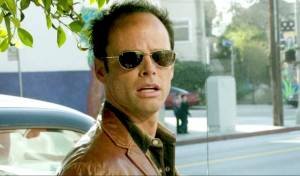Last night, Supergirl said farewell to Mehcad Brooks’s James Olsen, a character who has been with the series from the start. In his final appearance, he did what he had been doing throughout the last several seasons: made a noble, if seemingly hopeless, decision to put himself on the line to make the world a better place. It’s a motivation that is completely in keeping with the world of Supergirl, and one that fits James pretty well. This is, after all, the guy who put on a suit of armor and went out to fight crime as Guardian, knowing full well he lived in a city full of aliens and metahumans.
Videos by ComicBook.com
When Brooks was cast as James Olsen, the internet spiraled into angry debate, much like what happens any time a person of color ends up playing a traditionally-white role. For reporters and our audiences, it seemed like that was one of the defining narratives going into the first season, and so I asked Brooks whether he was tired of answering some variation on, “Why does Jimmy have to be a person of color?” I joked at the time that it had to be exciting looking forward to the second half of the season, when that would not be such a frequent topic of discussion.
Brooks told the reporters at a Comic Con roundtable that obviously James Olsen didn’t “have to” be Black, since he never had been before. But he also delivered a memorable explanation as to why he did not think he would tire of that conversation.
“This is the first time we’re doing it and to me, that just means that tin this country we’re moving in the right direction,” Brooks told me. “Also — it sounds corny but I’m a corny guy — it does go to show you: if you don’t think things are changing, all you have to do is look around — and we’re becoming more accepting of people, whoever they are. Doesn’t matter what they look like; it’s like judging people by the content of their character, or by the content of the scene.
At the time, he said that he was proud of his production partners and happy to be a part of the change.
“Me, growing up as a kid, I didn’t have anybody to look to,” Brooks continued. “One time, I dressed up as Superman and one of my friends’ parents told me, ‘You can’t be Superman; you’re black.’ Ten years old, nine years old, and I’m like, ‘Well, he’s from Krypton, so he’s probably not white either, right? He’s an alien.’ That was my thought process: he’s not from Earth. So it just goes to show, that mentality I think is leaving us, and I’m really happy to be part of the fact that there’s going to be little kids that look like me, who can now look at somebody and be like, ‘I can be like that.’ So I’m not sick of that question, actually. I’d like to answer it more.”
Ultimately, his explanation for why it took so long to get people of color represented in a big way in superhero comics, TV, and film was pretty simple and non-judgmental. He acknowledged that it was just a product of the time when most of the most beloved characters were created.
“Our great-grandfathers, they had a monochromatic existence, no matter who they were, and they wrote what they knew,” Brooks said. “We’re righting some of those inequities now, so we have a very cool little playground to play with and a canvas to paint.”
Supergirl airs at 9 p.m. ET/PT on The CW, following episodes of Batwoman on Sunday nights.









